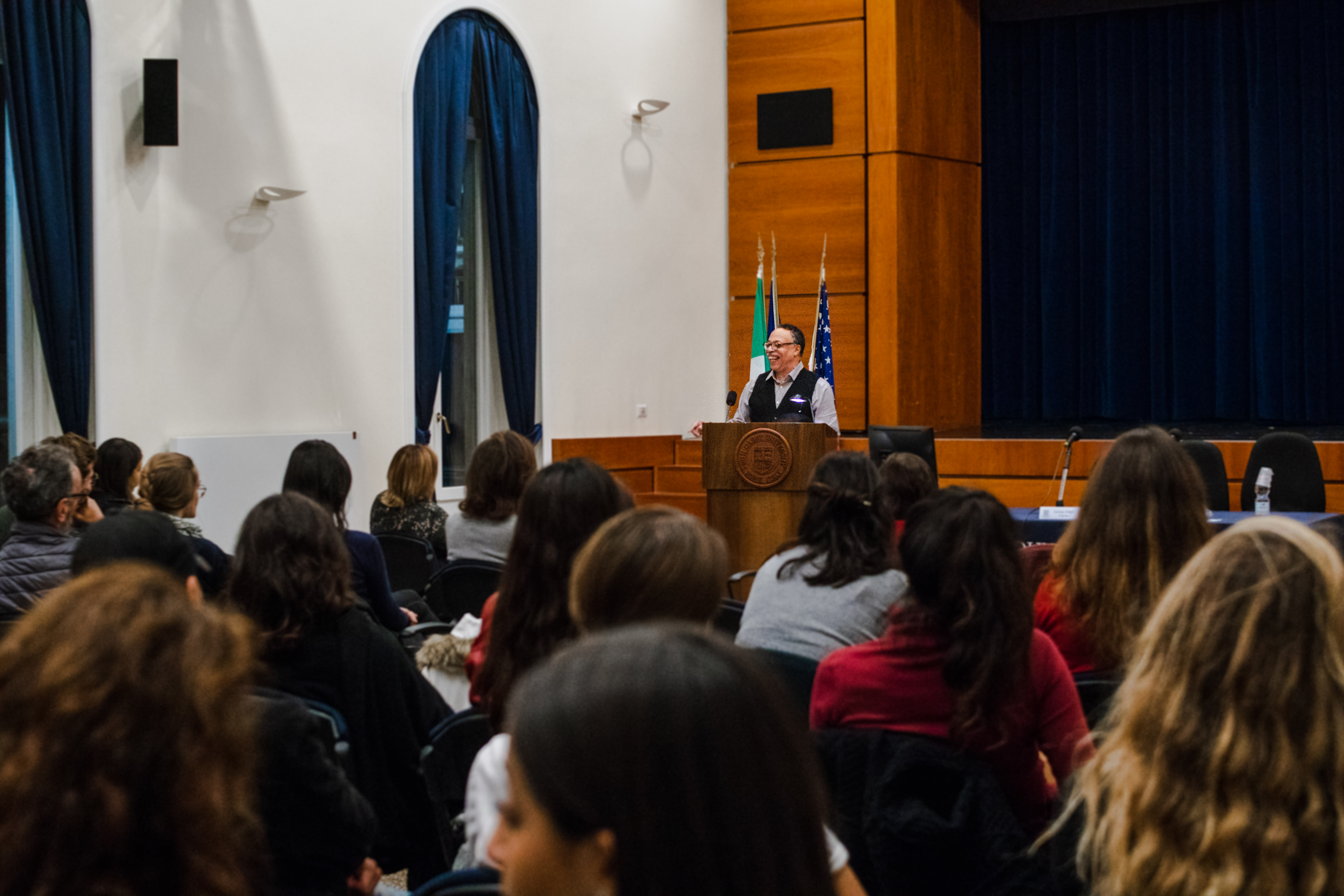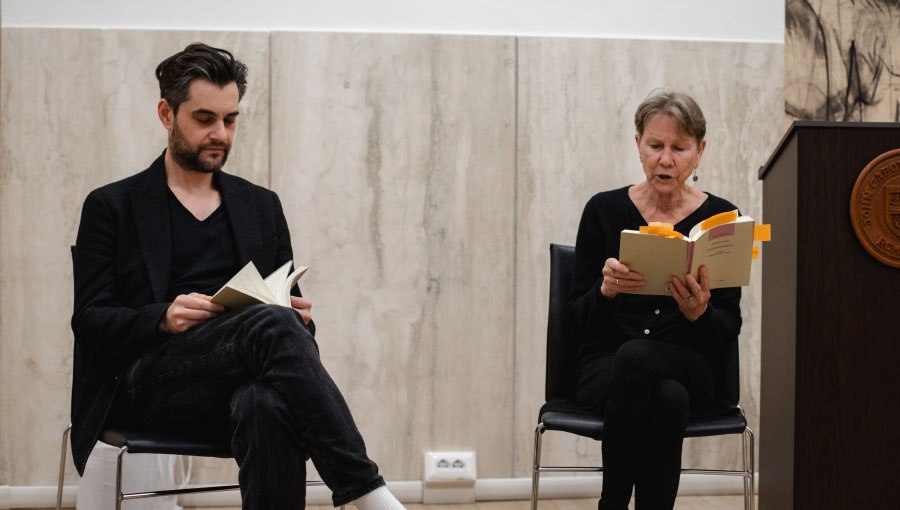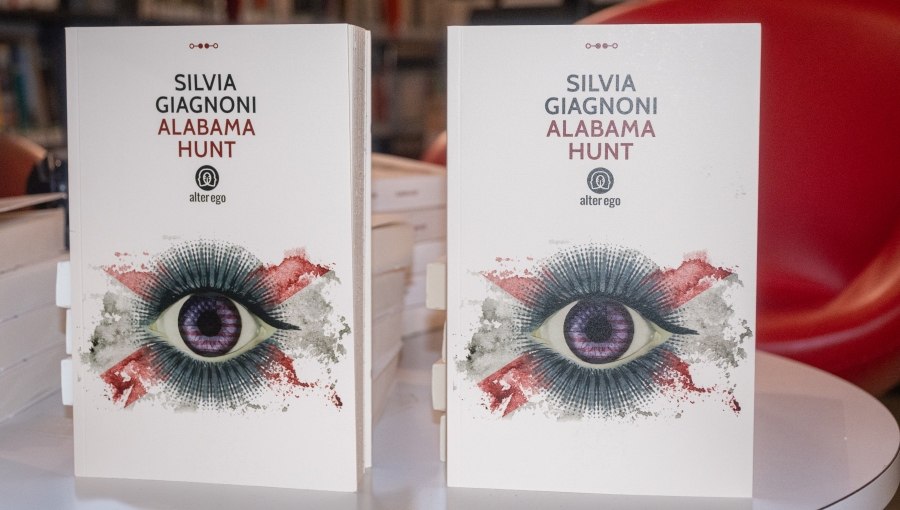Must Poets Hang with Murderers? A Conversation with George Elliott Clarke
The JCU Department of English Language and Literature welcomed poet, writer, and literary critic George Elliott Clarke for a talk called Must Poets Always “Hang” with Murderers?: A Meditation on Poetics and “Justice” on November 7, 2019. Clarke explored the relationship between poets and crime. The lecture was presented by JCU English Literature Professor Shannon Russell.
Murder and murderer, a poet’s inspiration?
Clarke started by recalling an example of how poets could become inspired by crime. He told the story of Ezra Pound (1885 –1972) who was an American modernist poet who came to Italy during the Second World War. Despite his anti-Semitism and anti-Americanism, Pound was a successful and famous poet, Clarke said. Pound was convicted of treason and imprisoned in Italy. While in prison, he wrote his Cantos (1917–1969), an incomplete poem in 116 sections. Clarke said that in Cantos, Pound referred to the execution of Italian Fascist dictator Mussolini and his mistress Claretta Petacci, as well as Louis Till, who was in the same jail as Pound. Louis Till was an African-American soldier convicted of rape and murder and sentenced to death by hanging. Clarke read a fragment of Pound’s Canto 74, saying “Till was hung yesterday \ for murder and rape with trimmings.”
Next, Clarke told the story of Emmett Till, the son of Louis Till, murdered at the age of fourteen in the US. Apparently, he flirted with a woman who felt threatened, Clarke said. After Emmett’s murder in August 1955, the photos of his massacred body “galvanized the Civil Rights Movement,” said Clarke. However, some media referred to his father’s execution and crimes as a justification for Emmett’s murder.
The murder of Emmett Till also inspired Gwendolyn Brooks to write a poem titled The Last Quatrain of the Ballad of Emmett Till. Soon after, Brooks became the first African American to win the Pulitzer Prize for Literature.

Poet George Elliott Clarke at JCU
Riel, García Lorca, and Mailer
The theme of crime was also prominent in Clarke’s literary influences. Among them, were the work and life of Louis Riel (1844-1885) Federico García Lorca (1898-1936), and Norman Mailer (1923-2007).
“My boyhood was haunted by the figure of Louis Riel,” said Clarke. Riel was the leader of two rebellions against the government of Canada in the nineteenth century that came to be known as The Red River Rebellion and the North-West Rebellion. Riel was fighting for the rights of indigenous people. As a result of his revolutionary actions, Riel was executed by hanging. “And then I learned that Riel was also a poet,” continued Clarke. “In my personal pantheon of Canadian heroes, Riel was a principal figure.”
“By the age of 23, after I published my first book of poetry, I became fascinated by the life of Spanish poet Federico García Lorca,” said Clarke. García Lorca was a member of The Generation of ’27, an influential group of poets in the 1920s and 1930s Spain, who experimented with avant-garde forms of art and poetry. He was murdered by a fascist force during the Spanish Civil War.
“My first serious attempt at a long poem occurred in January and February 1977,” said Clarke. He explained how he learned about “the unfolding drama of Norman Mailer.” Mailer was inspired by the media coverage around a trial of murderer Gary Gilmore. Clarke also followed it carefully, as it was talked about across the country. After researching the story of Gilmore, Mailer wrote The Executioner’s Song, a novel about the life and death of Gary Gilmore, which won the Pulitzer Prize for fiction in 1980. As Clarke discovered, Mailer also had a criminal passaid. In the 1960s Mailer attacked his own wife and almost took her life.
George and Rue and the discovery of a family secret
In 1994, Clarke started his first novel George and Rue (Carroll & Graf 2005). Clarke recalled that “In 1994, my mother, who was slowly dying of Alzheimer’s disease, disclosed to me suddenly that I had two cousins who were hanged.” Clarke was both devastated and fascinated by the news. “I had already earned three degrees in English, published three books of poetry and one edited anthology of my creative writing, and was 34 years old when I first heard of George and Rufus Hamilton who were aged 23 and 22 respectively when they were hanged for a murder on July 27, 1942, almost 11 full years before I was born,” said Clarke. George and Rufus were accused of murdering a taxi driver with a hammer. Clarke’s mother felt ashamed of their crime, so together with the rest of the family, they decided to erase their memory from their lives. “So effective was that conspiracy that I only found out about my executed cousins 45 years after they died.” What was even more striking to Clarke was that his first name, George, was a result of his cousins’ story. George was named after Clarke’s grandfather, George. As Clarke was the next male to appear in his mother’s extended family after the death of his cousin, George Hamilton, Clarke was named for his grandfather, George. Clarke concluded that “I knew immediately that I would write a novel about their lives as soon as I heard about them.”
Clarke explained how he started his research to discover the truth about the Hamilton brothers. “I went from knowing nothing about them, to possessing the actual piece from the 1949 newspaper given to me by a genealogist.” Clarke also traveled to the places where the brothers lived, looking for people who might have remembered them, “not only did Clarke write the novel, but also poems which were published separately as Execution Poems: The Black Acadian Tragedy of George & Rue (Gaspereau Pr, 2001).
“I had to understand what George and Rufus had to go through, the poverty and racism, to survive,” Clarke said. “Coming from a state of poverty, they turned from bad boys into bad men. But the state took pleasure in hanging them both.” He explained how the evidence suggested that it was Rufus who killed, while George was not even present in the car, yet the state did not take any of those explanations and evidence into consideration. Clarke emphasized that in the novel, he never put forward racism or poverty to justify their crimes because a lot of black people suffer these and only a minor part is pushed towards criminality.
“Yet I was wholly unprepared…” A friend, a poet, a murderer.
Clarke researched the topic of murder, punishment, death, and hanging through his novels, poems, and plays, even through his own family history. “Yet I was wholly unprepared when a good friend of mine, a poet, got convicted of a murder, 25 years ago, and sentenced to nine years in prison.” Clarke’s friend was an accomplice to murder of an indigenous woman. Clarke highlighted that his friend benefited from white skin privilege. “My friend ended up serving only 3.5 years because of a sexist and racist judge who decided that the victim, an indigenous woman, a sex worker, partly deserved the rape and death at the hands of two young white man.” The victim was “a person of color just as I am, widely subjected to the variety of racism that I as well suffer.” Clarke argued that the crime committed by his friend was vicious and unpardonable.
“My friend, the accomplice to murder of this woman, is an incredible poet. He is a very fine poet. As now he is in his forties, he is a fairly kind man, who has paid his debt to society as the saying goes, and so should be left to live his life.” Clarke admitted. Nonetheless, as he stressed, it is important to see his friend as both a great poet and as a murderer.
George Elliott Clarke was born in 1960 in Windsor, Nova Scotia, Canada. He is the 4th Poet Laureate of Toronto (2012-15) and the 7th Parliamentary/Canadian Poet Laureate (2016-17). A professor of English at the University of Toronto, Clarke has taught at Duke, McGill, the University of British Columbia, and Harvard. His recognitions include the Pierre Elliott Trudeau Fellows Prize, the Governor-General’s Award for Poetry, the National Magazine Gold Award for Poetry, the Premiul Poesis (Romania), the Dartmouth Book Award for Fiction, the Eric Hoffer Book Award for Poetry (US), and the Dr. Martin Luther King Jr. Achievement Award.





